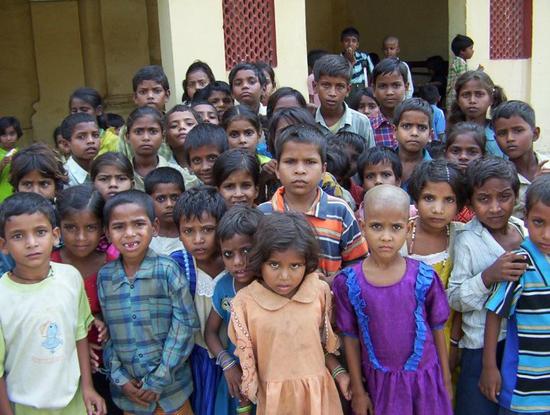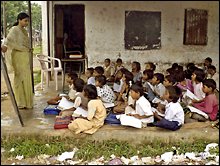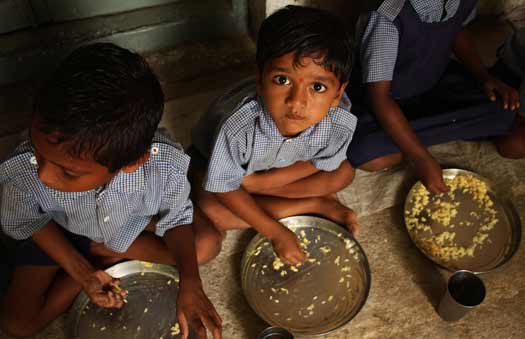
Though I am not the ardent supporter of policies framed by Manmohan Singh’s government ,I am happy that this government took a concrete step to change the face of elementary education in India.The Right of Children to Free and Compulsory Education Act enacted by parliament in August, 2009 came into force from April 01,2010. The Act enables that the children between 6 and 14 will get free education. This makes India the opportunity to become part of group of 135 countries which provide free and compulsory education to children,being bound by legal provisions in this regard.
The Prime minister was visibly happy to introduce this law framed keeping in mind provisions laid under Article 21A of the Indian Constitution. “Today our government comes before you to pledge all our children elementary education. The Right of Children to Free and Compulsory Education Act enacted by parliament in August, 2009 comes into force today (Thursday),” the prime minister said.
He stated that
” the fundamental right to education as incorporated in our constitution through Article 21 (A) has also become operative from today. This demonstrates our national commitment to the education of our children and to the future of India. We are a nation of young people. Education will determine the well being of our nation. Education is the key to progress. It empowers the individuals. If we nurture our children through right to education then India’s future is secured.”
In fact, I was happy to hear from a Prime minister so passionately about the role of education in a country like India that has a huge potential to emerge as a most powerful nation on the globe once it ensures better future for the kids and youths via quality education. That was quite evident when he stated that “we are a nation of young people. Education will determine the well being and future of the people of our country. India’s future as a strong and prosperous country is secure. All children should have access to education.”Making his intentions quite clear that every child deserves a better future he said that
“I want every Indian child, girl and boy, to be so touched by the light of education.I want every Indian to dream of a better future and live that dream”
Before I critically analyze the provisions,let me present in brief some of the main elements of this Act. “It specifies reservation of 25% seats in private schools for children from poor families, prohibits the practice of unrecognized schools, and makes provisions for no donation or capitation and no interview of the child or parent for the admission.[5][6].Provision for special training of school drop-outs to bring them at-par with the students of the same age. Right to Education of Person with Disabilities till 18 years of age has been made a fundamental right. The act also provides for establishment of the National Commission for Protection of Child Rights and State Commissions for supervising of proper implementation of the act, looking after the complaints and protection of Child Rights.”

The Act ensures quality education for all the class of children, girls, dalits, and adivaasis.This time a special care has been taken to ensure that loopholes should not sabotage the very spirit of Act. Starting from management of funds to appointment of teachers,the Act has made specific provisions. According to a news report the funds shall be shared in ratio of 65 to 35 between the Central government and the states.The Act also ensures that special training facilities shall be made available for the teachers. To make them accountable towards quality education ,the disciplinary actions have been introduced which will be immediately set in motion once the teacher is found guilty of being lax towards his/her responsibilities. A teacher who are devoid of proper qualification will have to get the desired qualification within five years.Above all, they shall not be alloted any other activity other than teaching.
The Act makes it obligatory for the government that it ensures ” proper infrastructure including school building,teaching staff and learning equipment”.It will be duty of both teacher and government to ensure good quality elementary education to the children.The teacher has been given the responsibility of ensuring all round development of the child. To make it a reality the teacher via continuous and comprehensive evaluation will assess the learning ability of the child at regular intervals.It’s now his legal responsibility that physical and mental abilities of the child gets developed to the fullest extent.Not only that he will have to organize meeting with parents at regular intervals wherein the teacher shall inform them the progress made in learning abilities of child. Interestingly, the teacher involved in physical punishment and mental harassment of child shall face disciplinary actions.
The child admitted shall not be held back in any class and also shall not be expelled unless he finishes elementary education.There is also provision for the drop outs and they shall be provided special training that brings them at par with standard required.These are some of the important features of this act.
Now let me view the provisions from a critical angle.The students have been kept above all sorts of physical punishment.However, we all know mild punishments prevent the student from deviating from the learning process.It will be a tough task for the teachers
to strike a healthy balance because of fears of facing disciplinary actions.It’s never easy task to provide quality education to the smaller kids.Though the Act also talks about children who are unable to complete education ,it’s not very clear as how will it reduce the rate of drop outs.It’s no secret that poverty stricken families rarely want to see their children in schools.
Well, it remains to be seen how the state governments across the nation are going to implement this Act. Mayawati has already given dangerous signals that she is in no mood to honour the wishes of Central government citing shortage of funds.That led Mr Kapil Sibal to state that ”
Uttar Pradesh (government) has loads of money that they are spending on memorials. If that very money was to be diverted to empower the children of Uttar Pradesh and of course the children of India, perhaps that would be money better spent”. A section of people believe that Act has no
” specific provision to bring the child labours back into regular school” who are almost no less than 12 million.
Anyway,the Education Act will certainly change the face of elementary education to great extent. According to a report prepared by UNESCO-Education for All Global Monitoring Report 2010- the free primary schooling is more the exception than the rule. I hope India makes free elementary education more a rule and less an exception !!!

References:
education.nic
thehindu
economictimes
ibnlive
timesofindia
yahoo
yahoo
yahoo
wikipedia
Pic Credit:Internet and Ambarish Srivastava



